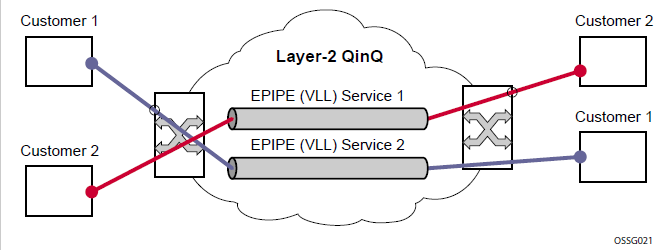An Epipe service is a Layer 2 point-to-point service where the customer data is encapsulated and transported across a service provider's network. An Epipe service is completely transparent to the subscriber's data and protocols. The 7210 SAS Epipe service does not perform any MAC learning. A local Epipe service consists of two SAPs on the same node, whereas a distributed Epipe service consists of two SAPs on different nodes.
The following support is available on different platforms:
The 7210 SAS-D, 7210 SAS-Dxp, and 7210 SAS-K 2F1C2T support only local Epipe services. The 7210 SAS-D provide null, QinQ SAPs and dot1q SAPs to provide point-point Layer 2 local services.
The 7210 SAS-K 2F6C4T and 7210 SAS-K 3SFP+ 8C support both local and distributed Epipe services. The platforms provide null, QinQ SAPs and dot1q SAPs to provide a point-point Layer 2 local and distributed service. The platforms support the use of MPLS tunnels for distributed services.
Each SAP configuration includes a specific port on which service traffic enters the 7210 SAS router from the customer side (also called the access side). Each port is configured with an encapsulation type. If a port is configured with an IEEE 802.1Q (referred to as dot1q) encapsulation, a unique encapsulation value (ID) must be specified.
Figure: Local Epipe/VLL service using access or access-uplink ports on the 7210 SAS shows a local Epipe (VLL) service using access or access-uplink ports on a 7210 SAS. Figure: Distributed Epipe/ VLL service using network ports on 7210 SAS-K 2F6C4T and 7210 SAS-K 3SFP+ 8C shows a distributed Epipe (VLL) service using network ports on a 7210 SAS-K 2F6C4T or 7210 SAS-K 3SFP+ 8C.

